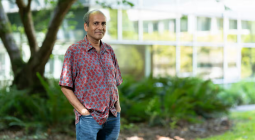Support for nuclear power will evaporate at next election, Chris Bowen predicts
Polling shows that Australians prefer renewables, climate change and energy minister says
Support for nuclear power is likely to evaporate once Australians face a clear choice at the next election and realise the Coalition’s policy would mean relying more on old coal plants and increased risk of blackouts, Chris Bowen says.
The climate change and energy minister said that while some polling had suggested some voters were open to nuclear plants being allowed in Australia surveys had also consistently found they preferred renewable energy.
“Every bit of research I’ve seen, public and private, says that when shown details and given a choice between nuclear and other forms of energy, nuclear fares very, very badly,” he said. “If you look at the popularity of different forms of energy, it’s solar, wind, gas, daylight, coal, nuclear, in that order, every single time.”
The Coalition has named seven sites where it says it would eventually replace coal-fired power plants with nuclear plants but not how much this would cost. Multiple energy analysts argue nuclear energy would be more expensive than other options and a nuclear industry would not be possible in Australia until after 2040. The bulk of the country’s coal plants are scheduled to close in the 2030s.
The opposition has suggested it would limit the rollout of large-scale renewable energy – it has criticised Labor’s goal of 82% renewable energy by 2030 – and bridge the gap by keeping ageing coal plants running longer and using more gas-fired power.
It has not yet said what type of gas plants this means. With nuclear banned, gas is the most expensive form of electricity in the national electricity market and it use is largely restricted to “peaking” power turned on only when needed. It provided less than 3% of electricity in the national grid over the past month.
The chair of the Australian Energy Regulator, Claire Savage, told a parliamentary inquiry she did not believe that nuclear plants could be built in enough time to cover the closure of coal-fired power plants. More than a quarter of the coal power capacity in the national grid was offline on the day she gave evidence due to planned and unplanned outages.
Polling on nuclear energy in Australia has produced varied results. A Lowy Institute poll in June found 61% strongly or somewhat supported its use alongside other sources of energy.
A Guardian Essential poll was roughly split between people who considered it “an attempt to extend the life of gas and limit investment in large-scale renewables” and those who said it was “serious, and should be considered as a part of the nation’s energy future”.
In an interview with Guardian Australia, Bowen said some Australians were open to nuclear energy but he was not concerned as there was a difference between people being open to it and agreeing to it.
“When you say to people, whether it’s in a formal market research setting or a punter in the street setting, ‘I don’t object to nuclear, morally … but I object to it because it’s so expensive, but probably even more importantly, because it takes so long, and we don’t have time if we’re going to wait the 20 to 30 years it would take, and that means more coal in the system and coal in the system longer, and even the Liberals aren’t proposing to build new coal-fired power stations so they’re just going to rely on these old ones longer, and that’s blackouts’ – then the support or openness evaporates.”
The Coalition’s climate change and energy spokesperson, Ted O’Brien, has promised more details of the opposition’s proposal before the end of the year.
He has rejected claims there would be a risk of an electricity shortage under its plan and said government and clean energy industry analysis of how much it would cost were inaccurate as they were not based on its full policy.
Cover photo: Chris Bowen says there is a difference between Australians being open to nuclear energy and agreeing to it. Photograph: Jessica Hromas/The Guardian



